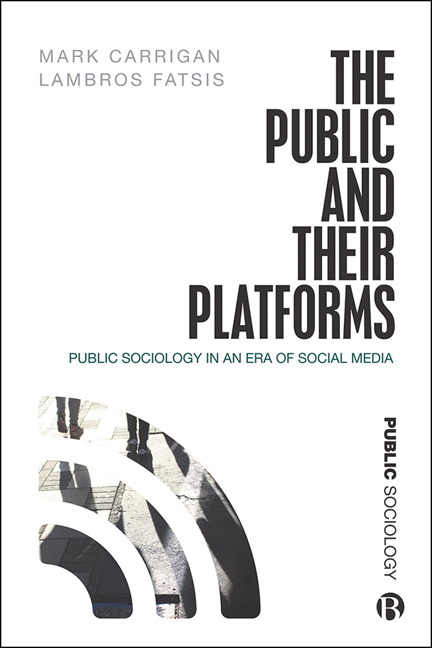Book contents
- Frontmatter
- Contents
- Acknowledgements
- Series Editors’ Preface
- Introduction
- 1 Defining ‘the Public’
- 2 The History of Platforms
- 3 Between Publics and Platforms
- 4 Sociology and its Platforms
- 5 The Past, Present and Future of Public Sociology
- 6 Making Sociology Public
- 7 Making Platforms Public
- 8 Assembling Public Sociology
- Notes
- References
- Index
6 - Making Sociology Public
- Frontmatter
- Contents
- Acknowledgements
- Series Editors’ Preface
- Introduction
- 1 Defining ‘the Public’
- 2 The History of Platforms
- 3 Between Publics and Platforms
- 4 Sociology and its Platforms
- 5 The Past, Present and Future of Public Sociology
- 6 Making Sociology Public
- 7 Making Platforms Public
- 8 Assembling Public Sociology
- Notes
- References
- Index
Summary
The range of ways in which sociologists are using social media is constantly expanding, leaving it difficult to make definitive statements about emerging practice. If we look carefully enough we can find examples of any social media platform we can think of being used by sociologists, even if it might be little more than a fleeting experiment or an activity with little reach beyond a limited network. But pointing out that sociologists are among the users of most, if not all, platforms provides us with little help when trying to conceptualize the sociological uses of social media. An attempt at such a declaration also encounters the obvious question of what it means for their use to be ‘sociological’. This is a problem which plagues the research literature on social media as it is far from self-evident where personal use ends and professional use begins (Carrigan 2019). In fact it is precisely this boundary which the uptake of social media within higher education is destabilizing, as the line between what happens ‘inside’ the university and what happens ‘outside’ it comes to look increasingly unrecognizable (Bacevic 2019a).
This has implications for how we conceptualize public sociology because if we persist with a common sense concept of getting beyond the ivory tower, any use of social media comes to appear as if it is public. If sociologists employed within universities have conversations between themselves, concerning professional matters and conducted in an obtuse idiom, does it become ‘public’ purely by virtue of taking place on platforms which originate and operate outside the university? But if we go to the opposite extreme and restrict our definition of public sociology to initiatives which seek to engage with publics as a deliberate undertaking then we miss out on a grey area which has great significance for what it means to do public sociology in an age of social media. Existing categories obscure a diffuse publicness which characterizes the use of social media by sociologists even when no explicit attempt is being made to pursue this (Healy 2017).
If the decentring of outputs, expertise and knowledge we advocate is to be viable, it requires a firmer grounding in the institutional conditions in which sociologists work.
- Type
- Chapter
- Information
- The Public and their PlatformsPublic Sociology in an Era of Social Media, pp. 127 - 148Publisher: Bristol University PressPrint publication year: 2021



